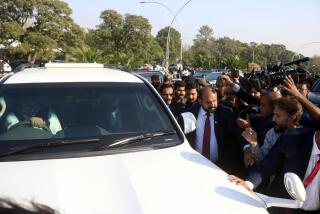‘Blood money’ tradition might help resolve U.S.-Pakistani row
Aziz Ahmed was supposed to die. In 2006 he used a meat cleaver to kill a friend he thought had been sleeping with his wife. He confessed and was sentenced to be hanged.
But last month Ahmed won his freedom; not because his confession was recanted or fresh evidence was presented, but because of a wad of cash. He paid the victim’s family $9,400 and walked out of prison a free man. The slain man’s relatives said they would use the money to buy the widow a cookware shop in this dusty farm town in Punjab, near the Indian border.
“We’re not bitter about this at all,” said Mohammed Nasir, brother of the victim, Ghulam Sarwar. “This money will take care of Ghulam’s wife and children.”
What outsiders might describe as “blood money” is a tenet of Islamic law sanctioned by Pakistani jurisprudence and used, by some estimates, in up to 60% of homicide cases here. The practice is called diyat, and it could be the means by which the United States and Pakistan extricate themselves from a dangerous diplomatic row that has strained relations between the two governments.
Washington and Islamabad are locked in a standoff over the case of Raymond Davis, the 36-year-old CIA contractor facing murder charges in the deaths of two Pakistani men in the eastern city of Lahore in late January.
Davis says he was the victim of a robbery attempt and shot the men after one of them pulled out a pistol. Authorities in Lahore say Davis’ self-defense claim doesn’t hold up and plan to put him on trial.
Despite whirlwind meetings between Pakistani leaders and top U.S. diplomats and lawmakers, the Obama administration has been unable to convince Islamabad that Davis has diplomatic status and therefore is immune from prosecution.
Though the United States has emphasized the importance of safeguarding strong relations with Pakistan, a crucial ally in the war on terrorism, it at one point raised the prospect of suspending billions of dollars in economic and military aid if Davis wasn’t quickly freed.
President Asif Ali Zardari’s government has balked at confirming Davis has immunity and instead has put the question of his status in the hands of the Lahore High Court, which is expected to take up the issue March 14. Zardari’s weak government, struggling to survive in the face of economic turmoil, waning support from political allies and a resilient homegrown insurgency, fears a backlash from the country’s intensely anti-American population if Davis is freed.
Relying on diyat could provide a face-saving way out for both countries, legal experts say. The U.S. would secure Davis’ release, and Zardari’s government would be able to explain to Pakistanis that the resolution occurred within the bounds of Pakistani law.
For diyat to work, the families of the two men Davis killed, Faizan Haider and Fahim Shamshad, would have to forgive Davis and agree to financial compensation as a resolution. Neither family has decided whether they would accept money.
Waseem Shamshad, Faheem’s brother, said his family would consider an offer for diyat. Fahim’s wife committed suicide shortly after her husband’s death, after saying she feared that Davis would not be tried. Imran Haider, Faizan’s brother, said his family is split on the issue.
“Some relatives suggest we should accept the offer so that the issue is resolved,” he said. “But 70% of the family says he should be convicted.”
Prime Minister Yousuf Raza Gilani first raised the prospect of diyat in the Davis case in mid-February. U.S. officials have refused to say whether they are considering such compensation to the families.
Human rights advocates view diyat as a flawed, easily exploitable custom that could allow the rich and powerful to kill with impunity and then escape justice by reaching into deep pockets.
“There’s a perverse incentive to murder…. You can pay your way out of it,” said Ali Dayan Hasan, South Asia researcher for Human Rights Watch. “The presence of this law on the books has led to situations where people can murder the vulnerable with impunity. Women and poor are most victimized.”
The law is commonly employed in cases of so-called honor killings, in which men kill a female relative, saying they are avenging shame she brought upon their family. The woman may be a rape victim, have married a man of her own choosing or divorced an abusive husband.
Many families coping with such a killing rely on diyat to resolve the case because the killer represents his household’s primary means of income, Hasan said. The family forgives the relative responsible, though often any payment is moot because the killer lives in the same household.
“If you are poor and you’re losing the family’s breadwinner,” Hasan said, “you are making a cynical calculation that the other person is dead,” and through diyat you can “keep the family together.”
Mohammed Mushtaq Ahmad, a law professor at the International Islamic University of Islamabad, estimated that diyat is applied in roughly three of five homicide cases in Pakistan. The amount of money involved varies widely, he said.
“Money cannot compensate for loss of a human being,” Ahmad said. “But diyat works as token money so as to declare that the loss of life is not without any consequences.
“Money may not compensate that loss, but it does show that human life has some value.”
More to Read
Start your day right
Sign up for Essential California for news, features and recommendations from the L.A. Times and beyond in your inbox six days a week.
You may occasionally receive promotional content from the Los Angeles Times.






